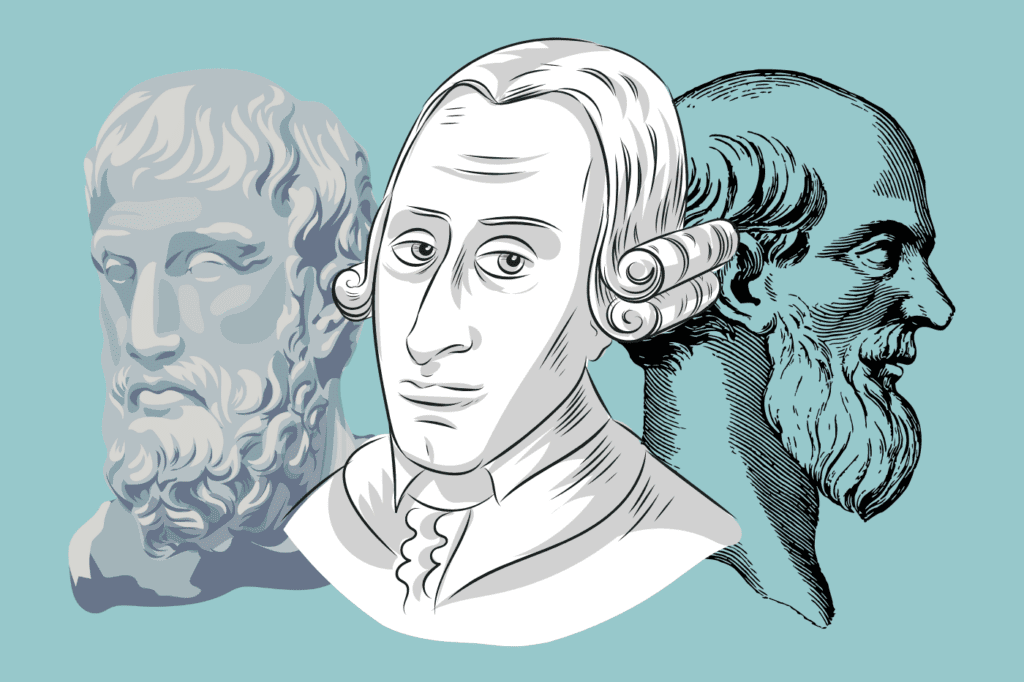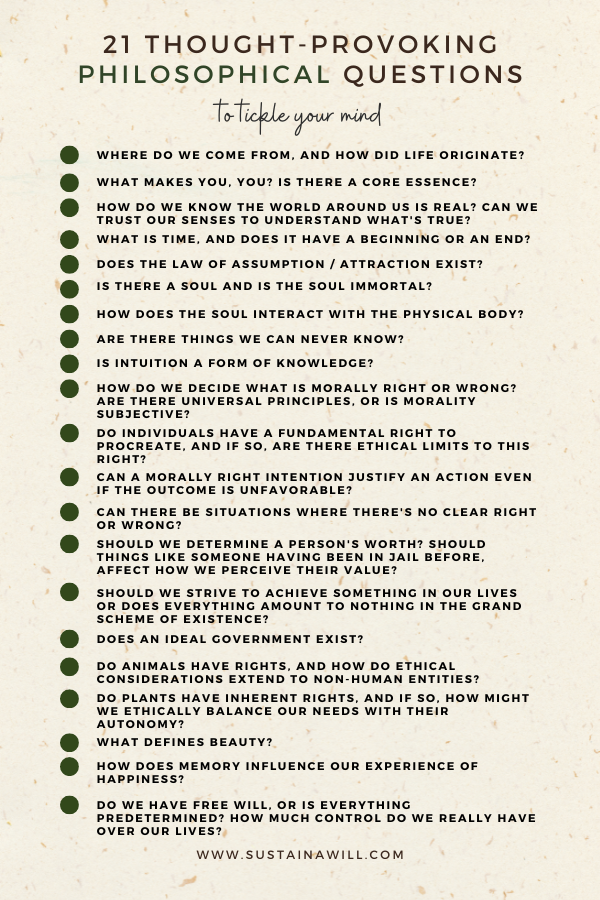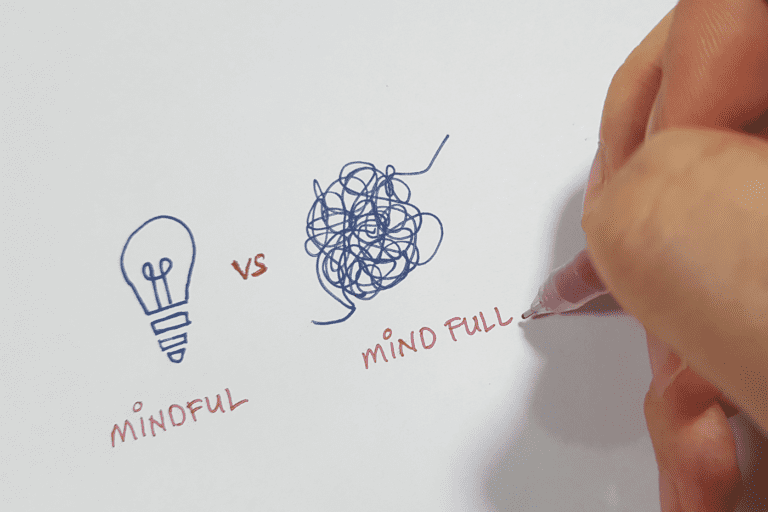Are you someone who likes to ponder the mysteries of existence, question the norms, or engage in thought-provoking conversations?
So, if you’re the type who enjoys a good mental workout, this collection of Thought-Provoking Philosophical Questions is here to spark your curiosity and make you go, “Hmm.”
Ready for a mental adventure? Let’s dive in and tickle that brain of yours!
What Are Philosophical Questions?

Philosophical questions are questions about the fundamental aspects of human existence, knowledge, and values. They delve into profound themes such as the nature of reality, the purpose of our existence, the limits of human understanding, and the principles guiding ethical decisions.
Unlike factual questions with clear answers, these are the BIG questions that don’t always have straightforward answers, and exploring them often takes us on a journey of reflection and contemplation.
Who is the Father of Philosophy?
Philosophy’s family tree has a global branch, and when we look to the East, Confucius steps into the spotlight as a key figure. Often regarded as the “father of Eastern philosophy,” Confucius, or Kong Fuzi, lived in ancient China around the same time as the ‘’father of Western philosophy’’ Thales of Miletus in ancient Greece.
What is the Hardest Question in Philosophy?

Ah, the stumper! Philosophers have pondered countless complex questions, but one that consistently takes the crown for difficulty is the age-old: “What is the meaning of life?”
This question touches on the realms of existence, purpose, and our place in the universe. Each person’s answer will vary, making it a perennial puzzle that sparked endless debates and contemplation throughout the history of mankind.
Thought-Provoking Philosophical Questions

What are the 4 big questions of life?
- Origin:
- Where do we come from, and how did life originate?
- Purpose:
- What is the purpose of our existence, and do our lives have inherent meaning?
- Morality:
- How do we determine what is right or wrong, and what guides our moral compass?
- Destiny:
- What happens to us after we die? Is there an ultimate destiny for humanity?
More Thought-Provoking Philosophical Questions
Philosophical Questions about Metaphysics
- What is real and what is just in our minds?
- Is God real?
- Do you think life could exist on other planets, or do you believe Earth is unique in hosting living beings?
- Does observing an event alter it?
- Do we have free will, or is everything predetermined? How much control do we really have over our lives?
- What makes you, you? Is there a core essence that defines your existence?
- How do we know what truly exists, and what is the essence of our existence?
- How do we know the world around us is real? Can we trust our senses to understand what’s true?
- What is time, and does it have a beginning or an end?
- What makes something the same thing over time, and how do things change while retaining their identity?
- What is the relationship between the mind and the body?
- Is the mind distinct from the physical brain?
- Do we have free will, or is everything determined by external factors?
- How do personal choices align with the concept of destiny?
- Is there an end to the universe?
- Does the Law of Assumption / Attraction exist?
- Is thought transmission real?
- How can we distinguish between what is truly real and what may be mere appearances or illusions?
- Is there a soul and is the soul immortal?
- How is the soul related to consciousness, and does it play a central role in shaping our awareness and experiences?
- How does the soul interact with the physical body?
- What is the nature of cause and effect? How do events relate to each other in terms of causation?
- Do universal concepts exist independently of individual instances, or are they mere abstractions?
- What makes something possible or necessary, and how do these modal concepts shape our understanding of reality?
- How do objects persist through time, and what role do temporal parts play in this persistence?
- What makes someone the same person over time, and how do we define personal identity?
- Are space and time absolute, or do they depend on the objects they contain?
Philosophical Questions about Epistemology:
- How do we know what we know?
- Are there things we can never know?
- Can we ever have complete knowledge about anything? Or is every understanding just a piece of a larger puzzle?
- What is the nature of knowledge, and what are the limits of our understanding?
- What is the nature of belief, and how do our beliefs correspond to reality?
- How certain can we be about our knowledge?
- Is skepticism a healthy approach to understanding the world?
- What are the primary sources of knowledge?
- How do experience, reason, and intuition contribute to what we know?
- Are there limits to what humans can understand, or is knowledge boundless?
- What defines truth, and how do we justify our claims to knowledge?
- Is knowledge built on foundational beliefs or a coherent web of beliefs?
- Is knowledge purely internal to the knower, or does it involve external factors?
- How does social interaction contribute to the acquisition and validation of knowledge?
- Is intuition a form of knowledge?
- How do we determine when to trust the testimony of others, and what role does trust play in knowledge?
Philosophical Questions about Ethics:
- What is the basis for determining what is right or wrong?
- How do we decide what is morally right or wrong? Are there universal principles, or is morality subjective?
- Can a morally right intention justify an action even if the outcome is unfavorable?
- Do individuals have a fundamental right to procreate, and if so, are there ethical limits to this right?
- What ethical considerations should parents take into account when deciding to conceive a child, and to what extent should they plan for the well-being of the future individual?
- In a world with concerns about overpopulation and environmental sustainability, what ethical responsibilities do individuals have regarding the decision to have children?
- Should there be ethical guidelines or legal frameworks in place to ensure that both parents actively and willingly consent to the conception of a child?
- Is the moral value of an action solely determined by its consequences, or does the intention behind the action carry equal or greater moral weight?
- Is there a moral obligation for prospective parents to consider their genetic makeup and potential hereditary conditions before conceiving a child?
- Can there be situations where there’s no clear right or wrong?
- Should we strive to achieve something in our lives or does everything amount to nothing in the grand scheme of existence?
- Should we determine a person’s worth? Should things like someone having been in jail before, affect how we perceive their value?
- What is the nature of ethical statements?
- Are they objective truths, or are they subjective expressions of personal feelings?
- What virtues should guide our actions, and how do they contribute to a fulfilling life?
- Is it morally acceptable for humans to intervene in the genetic makeup of future generations, essentially “designing” certain traits?
- How can we address the ethical challenges associated with unforeseen consequences or unintended outcomes of manipulating human genetics?
- How do we balance the desire for genetic enhancement with the importance of preserving diversity and the uniqueness of individual differences?
- What is the basis for treating everyone fairly?
- Is morality culturally relative, or are there universal moral principles that apply to all societies?
- How do we navigate complex moral dilemmas where different ethical principles may conflict?
- How do ethical principles apply to specific areas such as bioethics, environmental ethics, and business ethics?
- Should individuals prioritize their self-interest, or is altruism a more ethical approach?
- What gives rise to rights and duties, and how do they intersect with ethical principles?
- Why do individuals have obligations to political entities, and what justifies political authority?
- Does an ideal government exist?
- Do animals have rights, and how do ethical considerations extend to non-human entities?
- Should animals be granted moral consideration, and to what extent should their interests be taken into account in ethical decision-making?
- Can we attribute emotions to plants, even if they don’t express feelings in ways familiar to humans?
- Do plants have inherent rights, and if so, how might we ethically balance our needs with their autonomy?
- How does gender influence ethical perspectives, and what insights does feminist ethics offer?
- Are there ethical considerations in the pursuit of happiness?
Philosophical Questions about Aesthetics:
- What defines beauty?
- Is there an objective standard for art and aesthetics, or is it purely subjective?
- How does culture shape our perceptions of beauty, and how does it influence artistic expression?
- What is the purpose of art, and how does it communicate meaning or emotion?
- How has the concept of beauty evolved throughout history, and what influences these changes?
- Can art be morally evaluated, and does it have ethical implications?
Philosophical Questions about Logic:
- What is the nature of sound reasoning?
- How do we distinguish between valid and invalid arguments?
- How do we make generalizations from specific observations, and what role does probability play in inductive reasoning?
- What are common logical fallacies, and how do they undermine the validity of arguments?
- How do paradoxes challenge our understanding of logic, and what do they reveal about the nature of truth?
- What is the logic of necessity and possibility, and how does it influence our understanding of the world?
- How does language use logical structures, and how do linguistic expressions convey meaning?
- Can different logical systems coexist, and is there a single correct logic?
Philosophical Questions about Existentialism:
- What is the meaning of life? How do we find purpose and significance in our existence?
- What gives life meaning? Is there an inherent purpose, or do we create our own?
- What does it mean to live authentically, and how does authenticity contribute to a meaningful life?
- How does the awareness of our own freedom lead to anxiety, and how can we navigate this existential tension?
- In a world without inherent meaning, how do we take responsibility for creating our own purpose?
- How does the awareness of our mortality influence the way we live our lives and ascribe meaning to existence?
- In the face of life’s apparent lack of inherent meaning, how do existentialists confront the absurdity of existence?
- What will happen at the end of the world?
- Is it more important to be liked or respected?
- How do we leave a meaningful mark on the world? Is legacy important in finding existential significance?
- Is happiness derived from a sense of purpose or from the pursuit of pleasurable experiences?
- How does memory influence our experience of happiness?
- Is there a higher form of happiness, akin to Aristotle’s concept of eudaimonia?
Takeaway
As we wrap up our exploration of ”Mind-Tickling Philosophical Questions”, the journey doesn’t have to end here. To keep the mental gears turning and the curiosity alive, here are a few simple yet effective actions you can take:
- Join Conversations: Engage in discussions, whether online or with friends, to gain diverse perspectives on these questions.
- Read Philosophical Works: Dive into classic and contemporary philosophy books to deepen your understanding of different schools of thought.
- Start a Philosophy Journal: Jot down your reflections, thoughts, and even new questions that arise from your contemplations in a beautiful notebook.
- Explore Philosophy Groups: Join clubs or online forums dedicated to philosophy to connect with like-minded individuals.
- Watch Philosophy Talks: Tune into lectures, TED Talks, or YouTube channels discussing philosophical topics for fresh insights.
- Challenge Yourself: Pose these questions to friends, family, or even yourself, and enjoy the diverse responses they might bring.








